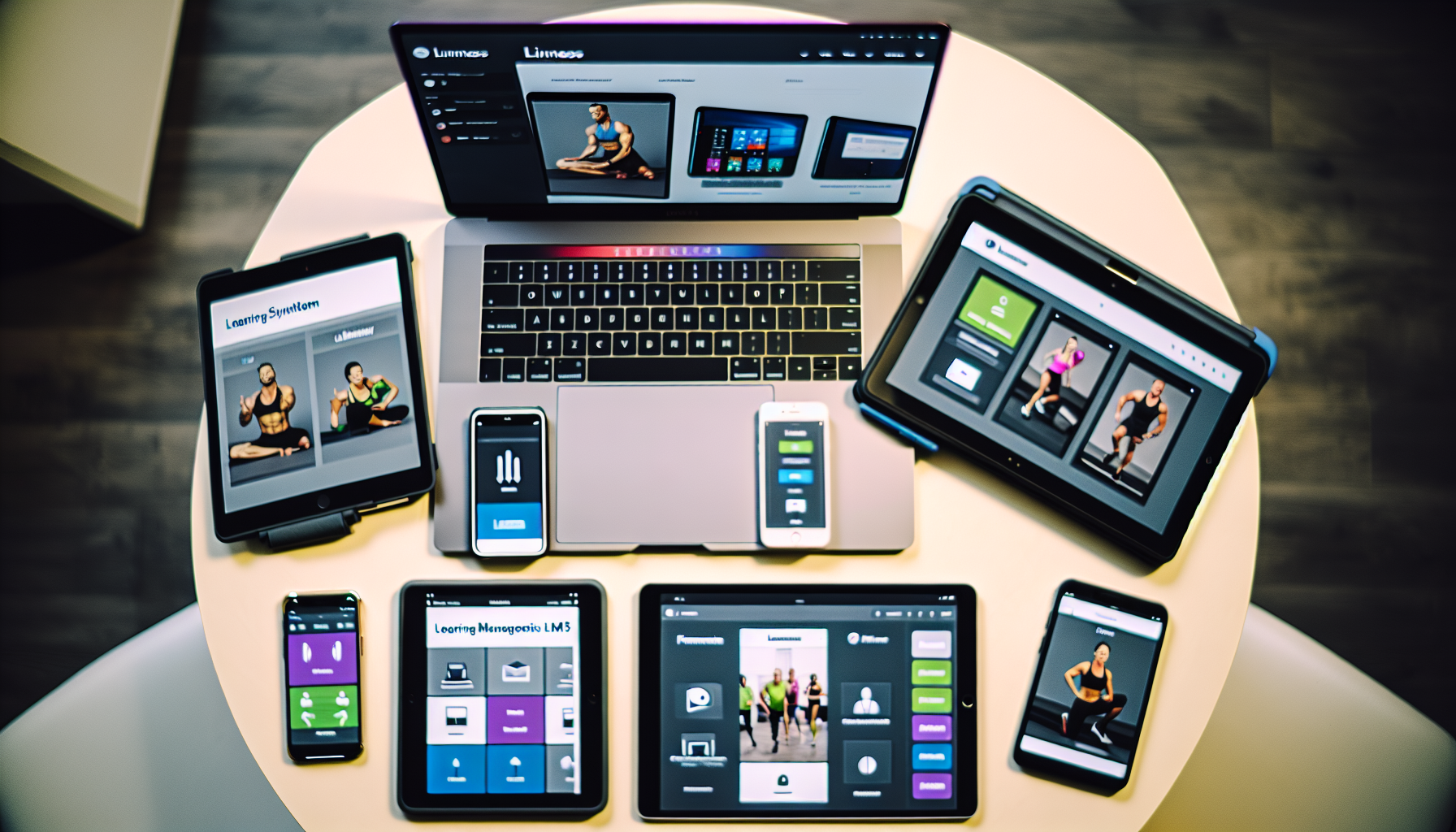As a fitness professional, you’re likely seeking an LMS for fitness that builds client loyalty, enhances training quality, and simplifies management tasks. Our focused guide demystifies the top LMS platforms, showcasing how they can power your fitness programs and elevate your business, all with ease and impact.
Key Takeaways
- Learning Management Systems (LMS) in the fitness industry streamline training, enhance client engagement, and improve business efficiency through structured learning environments and the automation of administrative tasks.
- Specific LMS platforms like Inspire360, ProProfs Training Maker, and Wisetail offer unique features tailored to fitness professionals, ranging from content delivery to social learning communities, while also presenting different limitations in terms of collaborative learning, customization, and reporting capabilities.
- Key features when considering an LMS for fitness businesses include content creation and management, tracking progress and reporting for learners, and ensuring the system’s integrations and scalability to support future growth and maintain seamless operation with existing tools.
The Power of LMS in Fitness and Wellness

Envision a tool that can streamline your training process, enhance client engagement, and boost your business efficiency. That’s what a learning management system brings to the fitness and wellness industry. An LMS enables you to plan, implement, and assess learning processes effectively, whether it’s for staff development or client education.
From offering structured learning environments to automating administrative tasks, an LMS is a game-changer for fitness professionals. We will delve into its potential advantages further.
Streamlined Training
Creating, managing, and delivering online courses can be a daunting task. However, an LMS streamlines these processes, offering a structured and consistent learning environment.
Imagine being able to:
- Create a comprehensive training program within minutes
- Efficiently manage your online courses
- Ensure your staff and clients have immediate access to learning materials and workout routines, anytime, anywhere
With an LMS, you can make all of this possible by providing all the tools needed for effective learning management.
Not only does an LMS save time, but it also enhances the quality of your training. Some benefits of using an LMS like Wisetail include:
- Blending education with engagement, turning learning into a dynamic journey
- Aiding in the professional development of fitness trainers
- Ensuring you deliver top-quality training to your clients
Enhanced Client Engagement
In any fitness program, keeping clients engaged and motivated is crucial. An LMS can greatly enhance this engagement through:
- Interactive content
- Personalized training plans
- Quizzes, surveys, and interactive assignments to gauge user learning and keep learners motivated
- Monitoring progress through eLearning video courses and live classroom sessions to provide personalized feedback and assistance in fitness training
These features ensure that clients feel seen and supported throughout their fitness journey in the fitness industry.
But engagement is not just about the content. It’s also about building a community. Social features in fitness LMS platforms, such as the ability for users to compete with friends or join virtual communities, increase motivation and adherence to exercise routines. By creating an inclusive environment of interactive content, personalized training plans, and community-building elements, an LMS enhances the client engagement experience.
Improved Business Efficiency
While an LMS improves the learning experience for your clients, it also enhances your business efficiency. By automating administrative tasks like content management, an LMS saves time and resources, leading to more efficient business operations. Additionally, LMS platforms enable you to track the training progress and course completion of your clients, which can assist in adherence to mandatory training requirements and skill-gap analysis.
The benefits of an LMS don’t stop there. Here are some additional advantages:
- Advanced reporting tools within LMS offer detailed insights on training performance, including data on instructor-led sessions and learner progress. This information is crucial in informing strategic decisions for enhancing training programs.
- An LMS provides a powerful analysis of user engagement and participation, facilitating strategic decision-making.
- An LMS enables personalized feedback through systematic data collection.
Top LMS Platforms for Fitness Professionals

Now that we’ve seen the power of an LMS, let’s explore some of the top platforms that fitness professionals can use. Each platform offers unique features and benefits, and choosing the right one depends on your specific business needs and goals.
Next, we will examine Inspire360, ProProfs Training Maker, and Wisetail, three prominent LMS platforms that could substantially enhance your capacity to provide personalized training and manage your fitness business efficiently.
Inspire360
If you’re looking for an LMS platform designed specifically with fitness professionals in mind, Inspire360 might be the perfect fit. This platform offers a range of features suited to the needs of fitness professionals, including:
- Drip course content delivery
- Recurring memberships
- Subscriptions
- A system to develop and sell certifications
These features not only streamline your training process but also provide you with diverse income streams.
However, no platform is without its limitations. Inspire360 has the following limitations:
- It lacks collaborative learning options
- It has limited assessment offerings
- It comes with an integrated e-commerce system for selling courses, starting at a price point of $1,000
Despite these limitations, if you’re looking for a platform with pre-built templates and diverse payment options, Inspire360 is worth considering.
ProProfs
ProProfs Training Maker is another strong contender in the world of LMS platforms. It offers a cloud-based LMS that is user-friendly, with access control through password-protected courses and customizable roles and permissions. This platform is particularly versatile and easy to use, making it a suitable choice for small fitness businesses or those just starting with online training.
One of ProProfs Training Maker’s standout features is its customization. This platform allows you to add external pages, manage blocks, and set calendar settings to tailor the learning experience to the specific needs of your clients. Pricing starts at $1.97 per learner per month for larger teams and comes with a 15-day money-back guarantee, so you can try the service risk-free.
Wisetail
Last but not least, is Wisetail. This platform is geared towards fitness trainer professional development and offers:
- Multimedia content
- Quizzes
- Assessments
- Certificates
- A social learning community
These features make it a great choice for businesses focusing on professional development and community-building.
While Wisetail offers a range of powerful features, it does have some limitations. Its reporting capabilities are limited, and there are restrictions on the size of videos and PowerPoint presentations that can be uploaded. However, with pricing based on custom quotes, it allows for pricing to be tailored to the specific needs of the fitness and wellness businesses, making it a suitable choice for a wellness business.
Essential Features to Look for in a Fitness LMS
Selecting the appropriate LMS platform goes beyond choosing the one with the most features; it entails finding a platform that best matches your unique requirements. When considering an LMS for your fitness business, there are several essential features to keep in mind. These include content creation and management, progress tracking and reporting, and integrations and scalability.
Each of these features contributes to a more efficient, engaging, and effective learning experience for both your staff and your clients.
Content Creation and Management
Creating and managing content can be a time-consuming process. That’s where LMS platforms come in. They provide the tools you need to efficiently manage your learning materials, from importing existing materials to creating new ones. For instance, Wisetail provides an intuitive drag-and-drop interface to simplify course authoring, making the process of creating and managing educational content more accessible for fitness trainers.
But it’s not just about creating content; it’s about making it engaging. By offering various types of content, such as videos, quizzes, and interactive materials, an LMS platform can accommodate different learning styles and significantly boost user engagement. Moreover, customization options in LMS content creation allow for the tailoring of materials to better fit the branding and specific training needs of fitness clients.
Progress Tracking and Reporting
Knowing how your clients are progressing is key to providing effective fitness training. With progress tracking and reporting features, LMS platforms offer a centralized repository for information storage and tracking. They also provide built-in reporting and analytics to track learner progress and engagement.
This information isn’t just useful for tracking progress; it’s invaluable for shaping your fitness programs. Detailed LMS analytics and reports can determine:
- learning trends
- learner engagement with content
- quiz interaction
- module effectiveness
This can help you, as a personal trainer, pinpoint areas for improvement and tailor your training to better meet your clients’ needs.
In addition, course completion rates and LMS reports on learner achievements aid in setting realistic training goals, pinpointing learners who may require additional support, and evaluating learning outcomes.
Integrations and Scalability
Finally, when considering an LMS for your fitness business, it’s essential to think about the future. An ideal LMS should be able to manage a growing number of learners, handle more data, and support an expanding course catalog without sacrificing performance. This ensures that your business can grow without the need for platform changes or custom development. Plus, customization options like personalized views, multilanguage support, ready-made themes, and mobile learning support contribute to both scalability and user engagement by catering to diverse needs and preferences.
An LMS should also integrate seamlessly with your existing tools. For example, LearnWorlds offers over 4,000 third-party apps for integration, including API, Webhooks, and SSO, which is essential for fitness businesses to maintain seamless operation and connectivity with existing tools.
Blended Learning Strategies for Fitness Professionals
Blended learning strategies offer a unique approach to fitness training. By combining online and in-person training, incorporating gamification elements, and leveraging social learning, these strategies create a more engaging, flexible, and comprehensive educational experience. We will examine each of these aspects to understand their contribution to a more effective learning experience.
Combining Online and In-Person Training
In the world of fitness, one size doesn’t fit all. Different clients have different preferences, and a blended learning model caters to these varying needs. By combining live, instructor-led virtual classrooms with periodic in-person trainings, the model offers flexibility and caters to different learning preferences.
Furthermore, an LMS facilitates eLearning by enabling fitness professionals to deliver training without geographical barriers, ensuring a consistent learning experience for all users. Add to this the mobile learning support that platforms like LearnWorlds LMS offer, and you have a flexible, convenient learning experience that reaches your clients wherever they are.
Incorporating Gamification Elements
Keeping clients motivated and engaged can be a challenge, but gamification elements can help. By incorporating scores, badges, and leaderboards, you can transform the learning experience into an engaging, competitive, and motivating activity.
LearnWorlds’s customizable badge system exemplifies how LMS can implement gamification to motivate learners and foster a competitive learning environment. Moreover, analog gamification methods such as fitness challenges and rewards can effectively motivate individuals and groups, independent of high-tech solutions.
Coupled with social features that allow users to compete with friends and join virtual communities, gamification elements can significantly boost motivation and adherence to exercise routines.
Leveraging Social Learning
Learning doesn’t happen in a vacuum; it’s a social activity. That’s why leveraging social learning in your LMS can be a game-changer. Social learning fosters a supportive learning environment and encourages the sharing of expertise, making the learning journey more interactive and engaging.
Features such as live chat functionalities and live sessions provide instant communication channels for peer support, fostering a supportive learning environment. Collaborative spaces like shared documents facilitate ongoing engagement and collaborative efforts among participants in a learning environment. By merging online platforms with human interaction, blended learning programs lead to higher engagement, through active behavioral, cognitive, and emotional involvement from learners.
Tips for Successfully Implementing an LMS in Your Fitness Business
Successfully implementing an LMS in your fitness business involves:
- Choosing the right platform
- Assessing your needs
- Creating a clear strategy for implementation
- Providing thorough training for your staff and clients.
Here are some tips to help guarantee a successful LMS implementation.
Assessing Your Needs
Before choosing an LMS, it’s crucial to understand your business needs and identify areas where an LMS can add value. Factors like the size of your business, the number of users, and the type of content to be delivered should be considered when selecting an appropriate LMS.
Remember, an LMS should be chosen not just as a tool, but as a partner that aligns with your business goals and enhances service quality and performance. Assessing current and future training needs is crucial for selecting an LMS that can grow with your fitness business and adapt to changing market demands. And don’t forget to set realistic timelines for implementation and allow for sufficient time for training and adaptation to mitigate resistance and technical challenges.
Developing a Clear Strategy
Developing a clear strategy for LMS implementation is crucial for ensuring alignment with business goals and enhancing service quality and performance. Involving employees in the process of identifying training gaps can lead to a more effective employee training program that’s likely to see higher adoption rates.
One effective approach is to empower subject matter experts to develop concise and actionable training content, which taps into their expertise and promotes a culture of shared knowledge. Creating project champions among stakeholders and well-connected individuals within the organization can also accelerate the adoption of the LMS and assist with change management.
Training Staff and Clients
Last but not least is the importance of training your staff and clients on the LMS platform. This ensures a smooth transition, high adoption rates, and ongoing engagement with the tool. Clear communication about the benefits of the LMS and how to use it is necessary for ensuring a smooth transition and achieving high adoption rates amongst staff and clients.
Fostering a culture of learning within the organization encourages the sharing of expertise and continuous engagement with the LMS among staff members. After the initial rollout of the LMS, providing ongoing support and training is crucial for promptly resolving any issues that arise and sustaining the tool’s effectiveness. Finally, holding regular feedback sessions helps gather valuable insights into how staff and clients experience the LMS, highlighting opportunities for further improvements.
Summary
To wrap up, a learning management system (LMS) is a powerful tool that can significantly elevate your fitness business. An LMS streamlines your training processes, enhances client engagement, improves business efficiency, and adapts to your specific needs. With the right LMS, you can deliver a comprehensive and engaging learning experience that caters to different learning preferences, keeps your clients motivated, and grows with your business. As the fitness and wellness industry continues to evolve, there’s never been a better time to harness the power of an LMS to elevate your training game.
Frequently Asked Questions
What is the most widely used LMS?
The most widely used LMS is Blackboard Learn, which is widely used by businesses, governments, and educational institutions. It helps educators streamline learning content delivery at scale.
What is LMS in human resources?
LMS in human resources refers to Learning Management System, which is a type of software used to train and educate employees, clients, and business partners, streamlining the learning process.
Is HealthStream an LMS system?
Yes, HealthStream offers a web-based learning management platform called the HealthStream Learning Center designed to help healthcare organizations manage training for their workforce. This can be considered as an LMS system.
What is LMS in health?
An LMS in health, or a healthcare learning management system, provides a platform for creating, providing, and tracking training programs for healthcare professionals. It supports learning and development in the healthcare sector.
What is a Learning Management System (LMS)?
A Learning Management System (LMS) is a software application used to administer, track, and deliver educational courses or training programs. It is also utilized in the fitness and wellness industry for effective planning, implementation, and assessment of learning processes.







